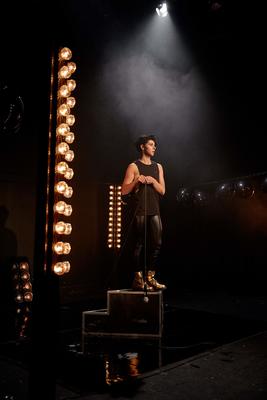Getting Started
How does someone gain experience in the industry? Here are a few ways of getting started.
Lighting Hire Company
Lighting hire companies have become a good way to get started in many branches of the industry, particularly concert touring and events. Most lighting hire companies have some kind of formal or informal training scheme, and some now run apprenticeships.
Often lighting hire companies have busy periods when they need extra help. One good way in for newcomers is to offer to work as a casual – to prove that you can turn up on time and do as instructed. There are lots of people who have begun their professional life in lighting in this way. Some stayed with the company, some went off to get degrees or other qualifications. Others branched out as freelancers once they felt they had learnt enough.
Most large scale lighting rigs, and many others too, are rented from a lighting hire company. Part of the job of the Production Electrician or Touring Chief LX is to negotiate the deal with the hire company, and to lead the preparation of the rig at the company’s base. The hire company staff can therefore have plenty of opportunities to meet and learn from these top practitioners.
Your Local Theatre or Concert Venue
Most theatres will have age restrictions on who can work there, but once you are 18, there are often casual jobs to be had by anyone who proves to be keen and hard working. You need to be realistic and understand the kinds of show your local venue puts on. A professional theatre or concert venue is not going to let you walk in and light a show, or even programme one. Even so, just being good at pushing boxes can be valuable experience, and put you in the right place to meet people who can help you take the next steps.
Formal Training and Qualifications
The most widely known post 16 qualification in England is the Production Arts BTEC. Some colleges do this really well. If you are thinking of applying, remember that this is really only a first step into the lighting industry. Find out where successful graduates of the courses you are interested in have gone and be sure that you can get what you want from the particular course before you commit yourself. Remember too that BTEC national diploma is not the only way to gain qualifications for your next step, and that good A-Levels, or an apprenticeship may be just as valuable for you.
Graduate Lighting Person?
A degree will not make you a lighting designer, programmer or touring chief, but it can help you on the way, and it can also give you something to fall back on should you decide that “touring” is not a job for your mature self. (It's worth mentioning that few lighting people work right through to retirement “on the road”, or even in a venue, for all kinds of reasons. A degree can help you start a new career more easily later on, should you chose that.)
One other important thing any degree should teach you is how to think, plan and reflect on experience. This is one reason why many graduates progress more quickly in their careers than none graduates.
Does it have to be a degree in Lighting?
No. The choice depends on where your interests lie – and these days especially – you should only consider doing a degree if you are pretty sure you are going to enjoy studying that particular subject – for three or four years. Most lighting degrees are hard work – so if your idea of university is a few lectures a week and an exam at the end of unit, then you probably should be looking elsewhere.
A good vocational degree (in lighting or any associated subject) will offer you opportunities to try out a variety of professional roles within the safe environment of the institution. It should also offer the opportunity to experience the actual industry – on placement or working evenings or vacations for professionals you have met through the course.
Most lighting degrees base their training on a theatre model, but don't be put off if theatre is not where you see yourself. Many courses have wider options in later years, (ask what these might be) and most areas of professional live performance value the discipline that theatre based training provides.
A vocational degree should teach you the stuff you need to know to practice safely too, and help you develop skills that will enable you to progress quickly through the industry, making the most of every experience.







